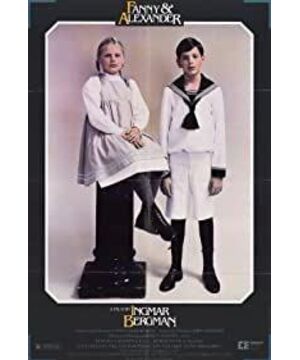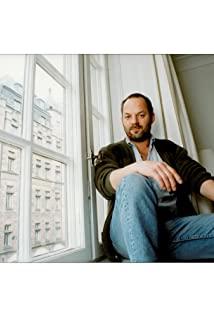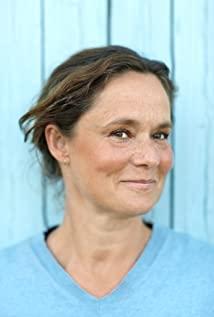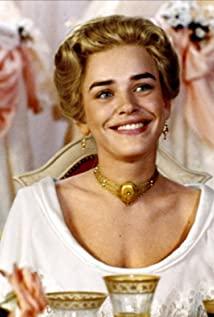The magic of isomorphism in Gestalt psychology? I think maybe it is.
In my opinion, "Fanny and Alexander" for Bergman, although it is not a good thing, but it can also be described as a superb. This well-recognized masterpiece of Bergman inherits his usual narrative method of mixing naturalism and mysticism, and brings together the themes of human nature, death, affection, and God, presenting ambiguity, compoundness, and ambiguity. But compared to previous works, Bergman used more realistic narrative techniques in it, which made this 5 and a half hour story more accessible and easy to understand, and made the issues he discussed in the film more in-depth and simple. .
Theme: "A Dream of Red Mansions" + "Hamlet"
Some people compare the story of "Fanny and Alexander" to the Western "Dream of Red Mansions". I think it should be a complex of "Dream of Red Mansions" and "Hamlet" more accurately. At the beginning of the film, it depicts a panoramic picture of the Swedish Ekeda theater family like Yu Rong and Ning. The prologue of the film shows us a children’s world and heart full of fantasy, loneliness and fear from the perspective of the protagonist Alexander. Just as Jia Baoyu has the talent to reciting poetry and writing, Alexander inherited the gene of the family drama, and he can easily edit it. Tell a story with a strong sense of substitution. Saying that the film has the shadow of "Hamlet" is not just because in the film Alexander's father Oscar died of a heart attack during the rehearsal of the "Hamlet" play. Alexander often saw his father's soul wandering in the world, and more importantly, in the film Inheriting the theme of revenge in "Hamlet", the death of Alexander's stepfather is not so much a collection of coincidences, as it is caused by the "sky fire" that Alexander cursed with his mind. In the face of coincidences, how many logical explanations are It seems weak, supernatural and subjective spiritual power may be more able to make us more directly approach Bergman's work.
Theological deconstruction
Some people say, do not trust God for Bergman is a call for trust, for he did not believe the expression is the more intense, more poignant, more so the piercing, it just shows, The more he desires to get any answers and proofs about trust. This reminds me of a recent independent movie "Bad Lieutenant" starring Harvey Keitel (it was later adapted by Hollywood and starred by Nicholas Cage), in which Harvey Keitel has always been distrusted God, the bad police officer who despised God, and when his life was gradually dying out, he actually knelt in the church hysterically pleading for Jesus in the illusion. This scene is very similar to Bergman's other handed down work, "The Virgin Spring," in which the farmer kneels on the land where his daughter was raped and murdered and looks up at the sky that shocked the entire Western world. Whether this is a tribute or a malicious imitation, in the two works, the difference is that there is still no way to salvation, and death is the final destination.
The 1960s was the chronological period of European history, and the old system faced major global challenges. All traditions, existing rules, doctrines, morals, and beliefs have become objects of questioning. European modern film masters headed by Bergman have raised questions that are deeply rooted in people's hearts, such as the good and evil of man, the relationship between man and God, and the life and death of man. Sartre’s irrationalism once said: “If God does not exist, then everything will be permitted.” And “whether God exists and why is silent” is the ultimate thinking throughout Bergman’s works. The family of the farmer in "Virgin Springs" are faithful servants of the gods, but the ending brings the farmer and his wife the grief of bereavement; in "The Seventh Seal", the knight bravely and the god of death cannot win the next game. In the game of chess, the game of calmness and calmness cannot change the fate of death. He said in the church: "We want to believe, but we can't." In "Fanny and Alexander", the incarnation of God simply becomes With a huge, bloated puppet, even the identity of the first negative character in the film is a decent bishop. Although he has a prominent position, his personality is incomplete and atrophied. In such a series of works, I have seen Bergman's process from questioning to unbelief, from expecting to a complete break with God. Theocracy and patriarchy have become dogmatism that imprisons thoughts. In the eyes of the world, they are the standards for advertised everything, but in Bergman's eyes, these are merely endorsements of hypocrisy and self-deception.
The screenization of the stream of consciousness and mysticism are
influenced by Sartre's existentialism and Freud's psychoanalysis. The masters of European films like to dissect the behavior of characters to the subconscious level. For example, Fellini's "Seven and a half" and Bergman's "Wild Strawberry" are classics of screen-based works of dreams and stream of consciousness. In "Fanny and Alexander", little Alexander always uses his strange imagination to bring us into a world of stream of consciousness, such as the scene of the end of the world in the desert, the soul of father Oscar, the sculptures of spiritual possession, skeletons...this Waiting for the imaginary scene in the illusion, we have a clear insight into the infinite world of a lonely, fearful, and weak child.
In fact, interspersing the elements of mysticism in realist themes is a very dangerous thing. If it is not done, it will cause self-immolation. Second, recent Chinese film directors have tried repeatedly, and all kinds of so-called magical realism themes are flooded. screen. From "The Sun Also Rises" filmed by Jiang Wen for God to the "Butterfly on the Shoulder" which thundered to all living beings, it is fully illustrated that the mashup of these two themes can not be done by anyone, just a little wrong effort. Will greatly weaken the sense of substitution of the film itself. In "Fanny and Alexander", the appearance of this mysticism element does not affect the main theme of the film at all, but also promotes the development of the plot: in one scene, Jacob rescues Fanny and Alexander from escape. When the plan was about to fail after leaving the bishop’s house, the two children who had been hiding in the box were turned back into the room by Jacob’s roar; at the end of the film, the fire in the bishop’s house can be said to be The result of Alexander's thoughts..... This situation of using fantasy as a weapon to turn the cruel reality into a satisfactory situation not only satisfies the audience's expectations, but also perfects the artistic expression of the film itself.
While watching the documentary of the movie of the same name, I saw Bergman in working condition, watching him interspersed in the filming scenes, completing one after another complicated actors and shot scheduling, and the admiration was born spontaneously. He once said: "I roam in scattered time. In fact, I always live in my dreams and occasionally visit the real world." I think I can only achieve this with the spirit of completely combining myself with light and shadow. A film philosopher who has shocked the past and the present. Although in life, how Bergman handles his relationship with others badly, just as the girl who made Roman Polanski made mistakes when he was young grew up, he felt: "Artists will eventually be affected by art. Great and forgiven all the mistakes he made." I think that a great artist's contribution to art can be more or less a way of making up and redeeming his life. If Bergman is standing alone on the beach of Figaro Island, when thinking, many people like me may only see a monument that can not be surpassed in the history of world cinema, but maybe at that time. In his heart, there is an Alexander who will never grow up. He is hiding under the table, looking at this cold and cruel world in fear and astonishment...
View more about Fanny and Alexander reviews











